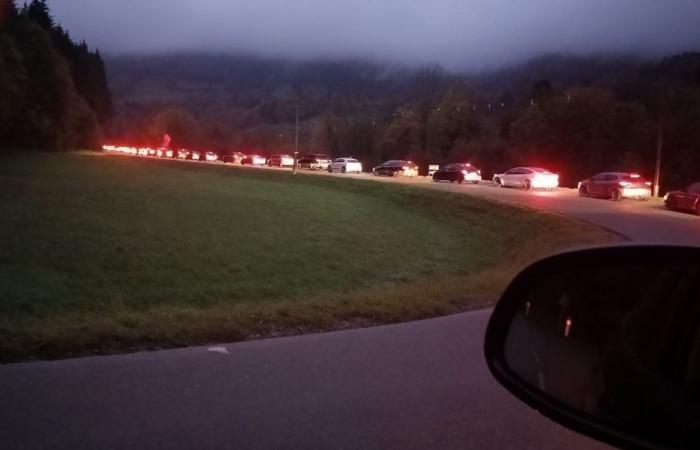In Haut-Doubs, cross-border workers working in Switzerland have been angry for several months about the heavy traffic jams encountered every day on the road. After alerting people to the situation, several cross-border workers are trying to come together to propose solutions.
The essentials of the day: our exclusive selection
Every day, our editorial team reserves the best regional news for you. A selection just for you, to stay in touch with your regions.
France Télévisions uses your email address to send you the newsletter “The essentials of the day: our exclusive selection”. You can unsubscribe at any time via the link at the bottom of this newsletter. Our privacy policy
Train lines, carpooling areas, better communication and planning of road works: after the anger, the desire to make things happen among Franco-Swiss border workers. A few weeks ago, we gave the floor to several Francs-Comtois, exasperated by the situation at the Swiss border, where numerous traffic jams were daily lengthening their journey times due to works or accidents.
► ALSO READ: At the Swiss border, traffic jams from 4 a.m. to 9 p.m…. what if the solution for cross-border workers was the train?
“4:00 a.m., Jougne roundabout traffic jam“, “More than 40 minutes to go 500m after Vallorbe customs, direction France at 8 p.m.“, “1h15 to go through customs Jougne Haut!!!!! At 2 p.m. no less, and apparently, it's been like that all afternoon…..“. Photos of stopped cars, in single file, messages of discontent are frequent on the Info Trafic Haut Doubs Facebook page. Faced with this disabling situation which is not improving, cross-border workers have decided to take the things in hand.
First step: writing an open letter with a clear and clear title: “call to rethink cross-border transport in Haut-Doubs“. With an exposed input message: “a burden weighs on our shoulders: that of the road“.
Every day, the kilometers we travel are punctuated by traffic jams, roadworks, accidents and unforeseen events. These obstacles, many of which are inevitable, heavily affect our daily lives.
Extract from an open letter from cross-border workers,Haut-Doubs Traffic Info
“We're talking about several hours lost each week, days that start well before sunrise and end late in the evening.“the letter states.”Just getting to our workplace becomes a physical and mental ordeal“.
Traffic jams on the road to La Chaux-de-Fonds, in June 2024.
•
© Rockette Heitzmann – Info Trafic Haut Doubs – DR
At the origin of this call, Mickaël Schoepf. “I have only been working in Switzerland for four years” explains this resident of Doubs to France 3 Franche-Comté. “But I immediately saw the scale of the problem. Every time I spoke with a cross-border worker, the first thing they asked was “was it the road”? And a lot of people were having a very bad time, some even wanted to quit their jobs because of the car time. It was no longer possible“.
It is to remedy this situation that Mickaël Schoepf, in agreement with Raphaël Borne, creator of the Haut Doubs Traffic Info page, decided to publish this appeal. With the objective of bringing together as many users as possible, in order to have influence in the negotiations and to be able to be a source of proposals. “We no longer want to just “complain” ” explains Mickaël. “We are ready to engage alongside communities to work together on real, sustainable solutions adapted to our daily lives.“.
In detail, some avenues have already been mentioned. The first, already supported by another group of around sixty cross-border workers, wants to develop the use of the train. ” Even if things have improved a little with the reopening of the Horlogers line, after eight months of work, the train is still underused” believes Mickaël Schoepf. “More efficient and regular lines would help relieve congestion on the roads, and it would also be good for the ecology.“.
The Watchmakers line was put into operation in 1884.
•
© Antoine Laroche – France Télévisions
In the sights of cross-border workers, the connection between Pontarlier and Vallorbe, passing through Frasne. Currently, only two TERs make the round trip. Many cross-border workers would like to increase this number. Another idea: use one more station. In 2022, a report from the European Cross-border Group (GTE) estimated that TER timetables were only suitable for “only 17% of users”. He proposed that a “additional stop at Longevilles Mont d’Or adds[rait] 40% of potential users“.
In addition to trains, Mickaël Schoepf campaigns for “the creation of well-designed carpool parking lots, with safe and easily accessible spaces, because those that exist are placed before the traffic jams and therefore do not change anything in traffic“. “We hope that this call will be heard, and that concrete actions will follow. Together, we can change things and ensure a better future for all the inhabitants of Haut-Doubs, because the ecological preservation of Haut-Doubs is also at stake.” we can read in the appeal published on Facebook.
On the community side, has this call been taken into account? “We are aware of these demands, which do not date from yesterday” explains Michel Neugnot (PS), vice-president of the Burgundy-Franche-Comté region, particularly in charge of mobility. “But the lines pointed out by border workers are governed by Franco-Swiss agreements. We are required to work with the Swiss railway network, which does not operate in the same way as us“.
As soon as we can make efforts in favor of cross-border workers, we do so. But only when there is compatibility with the Swiss network. For Vallorbe or Longevilles, future developments are not on the cards.
Michel Neugnot,vice-president of the Burgundy-Franche-Comté region
What about carpooling? “This is work that we are already carrying out with local communities, and for a long time” continues Michel Neugnot. “They can create a local network via our Mobigo covoit tool“Faced with the situation on the Swiss border, is the region considering taking the initiative to create new areas?”This is not work provided for by law” concludes the vice-president of the Burgundy-Franche-Comté region. “Given the number of user associations, we do not make promises we do not want to keep“.
Contacted by France 3 Franche-Comté, Franche-Comté customs were not able to respond to us within our publication deadlines. However, their new director, Estelle Rocklin, assured on October 25 in an article in L'Est Républicain that they wanted “move forward with our Swiss partners and present solutions for simplification and fluidity when crossing the border […] We need to move forward quickly on this subject.“.
Answers that do not satisfy Mickaël Schoepf. “It's very sad” reacted the author of the call. “We are told about efforts and solutions that are already present, but we still need to be informed about them. But I am sure that together, around a table, we can find solutions to ensure the health of workers and that of our environment.“. The fifty-year-old also specifies that he has not yet contacted the communities concerned. “We do not yet have definitive solutions to offer them” he justifies himself. “We are in the testimonial collection phase“.
With this in mind, Mickaël Schoepf invites anyone who feels concerned by this issue to contact this address by email: [email protected]. “We have already collected several hundred testimonies, proof that this subject is important and topical.“.
► ALSO READ: Unemployment insurance: “Why stigmatize cross-border workers? Not everyone earns 10,000 euros!”
The objective will then be to form an association to propose concrete solutions to regional partners, by bringing together individuals, but also already existing cross-border movements. In this sense, a meeting between users should take place in the coming weeks. For real change, or a new twist in the water? To be continued.






